John Jughead Pierson's Blog, page 4
May 18, 2016
EIB Record Titles
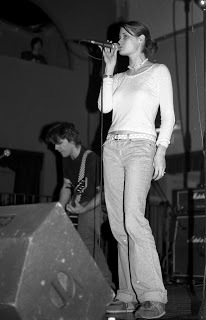
I have had many friends that are masters of appropriating pre-existing material . It is a form of creation, that views with a critical eye, the creations of others, and steals to make it one’s own. Many of my actor friends are good at this, it is also a technique that Ben Weasel used on almost every Screeching Weasel record title. I was never very good at this, this technique is often a surefire way to capture an audiences attention. You have to have a keen understanding of pop culture, and underground trends, and how to accurately listen to the pulse of your audience. I can never sense things too far outside myself to use such tools. With many elements of Even In Blackouts, it was my goal to be wholly me, in the moment and hoping to discover a few universal truths, not appropriating a complete concept but to borrow parts and mingle them with my own jumbled ideas. (Of course, mixed and influenced by the amazing creative voices of the musicians and friends I have been able to work with.)
(What I nurtured through my love of 70s concept records combined with Ben Weasels take on it, was to admit that during a period of time, an artist is creating from a certain point of view, and one cannot escape from this point of view, until the facets of it have been fully explored. So in Screeching Weasel then with me in Even In Blackouts, we began to explore loose concept records, admitting that a collection of songs marks a point in time, when although they may seem diverse, are really a study from one frame of mind, striving to be manifested through multiple perspectives.)What follows is a music geek’s interpretation of my album titles for Even In Blackouts:Myths & Imaginary Magicians:
This is a reference to the first song I wrote for EIB, Missing Manifesto. The song itself is about: Will the art we make excuse the behavior we conduct while achieving our goals? If we create good art it justifies our self destruction and our asshole behavior to others, if it does not create impressive art, we are just another asshole in a sea of stupidity. It also had to do with the idea of trying to live up to a perception of the self from the outside, do we become what we are perceived to be? Do we fight against what others believe us to be? How do we just try to be ourselves when the myth gains strength over time? The imaginary magicians part was my criticism of this striving to be in control of your own myth, to me it is like striving to be a magician with no audience that really matters, complicating our relationships because it seems enigmatic and complex. (This album is predominately about my obsession with my friend Peter’s Suicide and the decaying of my working relationship with Ben Weasel.)Four Shadows on a Wall:
This is a title that I worked on with Dan Lipman. Even In Blackouts uses, as themes, glowing, shadows, and the affect of light, as a metaphor for trying to find meaning in our lives through the pursuit of art as a living, and also a more literal reference to being able to play in blackouts. The concept behind the title is more about fun wordplay than meaning. Most of the meaning came after the title was decided. Dan and I liked the concept of combining the fact that there was now only four of us with the idea of Plato’s shadows on the wall of a cave. And when Dan brought this up, I was excited, because it alluded to my prior themes of trying to break through the illusions to see what is really there. Is it just shadows? Are we just superficial? Can we actually get to a deeper meaning through the used of lyrics and music?Zeitgeist’s Echo:
Zeitgeist, the literal translation from the German is Time Ghost, or the spirit of the times. This title was my more puffed up view of what I was trying to do with EIB. I thought I was trying to break barriers, but I was never sure if they were just barriers of my own making or barriers of music in general. I guess I was always hoping my band would be creating something unique, but ultimately what became more important is creating something I had never done before, to use guitar chords I had never used before, and to challenge Liz, who after the first record, I realized that she was an amazing singer who’s talents exceeded my own understanding of music. She helped me challenge myself. So the idea of the Echo, was a puffed up belief that in general the world was producing art that imagined itself “of the time,” but was really just living in an echo of what had happened previously. It was a title to force myself to try to break my preconceived notions of what a band was supposed to be doing.Fall Of The House Of Even:
I had been studying the Edgar Allen Poe short story Fall Of the House of Usher, when my band began to fall apart, and all that was left was me an Liz, and a new drummer, Bice, who lived hundreds of miles away. Liz freaked out when the Lipmans left the band, and she believed it was the end. But I had experienced in Screeching Weasel a similar change of ranks between Boogada Boogada Boogada and My Brain Hurts. I knew that an overhaul like this COULD lead to a more fruitful arrangement of musicians and friends. (In this case Gub Conway & Phillip Hill) I had also been going through a break up, of a sexual nature, and much of this came out in the writing too. I had asked the new member Gub to contribute some songs, and I told him that I had been playing with the idea of decay and hauntings in the style of Edgar Allen Poe, specifically the affect of ghosts on our decision making in the present, how our baggage never really goes away. This record is where I learned that I could still commit to concept records and trust Gub to write alongside me, to join in the concept, to try his hardest to understand what I was trying to do, and to commit fully to making it work in his writing for the band. Bice and Phillip used to say that there job was to try to make musical sense out of the fucked up ideas Gub and I would create. I always liked that idea. It was comforting.Thresholds From The Basement:
We had no label and no money. Fans helped us raise the money to build a studio in my basement and to continue onwards. The record is about doors. That is what I told Gub. I told him to write songs about the moment of walking through a doorframe. This records is about the moment of change. It is about those moments we pop out of ourselves and watch from above and witness ourselves moving from one chapter in our lives to another. The added layer I gave myself was to see this concept through very personal relations with my family. The concept behind song titles, of which we only committed partially, was to create ones that were not easily remembered. I had a good time with this for many of the songs on the record.So, there it is. I hope you found some enjoyment in reading this, and that it may cause you to listen to these open-veined-songs we created for you.John Jughead Pierson
Published on May 18, 2016 21:41
April 1, 2016
Here are two contrasting pieces that I continue to perfor...
Here are two contrasting pieces that I continue to perform almost 15 years after they have been written for the show Too Much Light Makes The Baby Go Blind. Maybe now that the New York Neo Futurists have put them to film, I can let them rest.
Our goal at the Neo Futurists is to write personal material that has insight into what is going on currently in our world and also to simultaneously create a way to emotionally connect with our individual audience members. And since I have done this for nearly 20 years and the short plays we write change out every few weeks, it has give me plenty of time to fail and to grow. I have probably created over 350 of these short pieces. These are not examples of my best live work, often the best work for stage is made only for the live experience of the stage and when brought to another art form, for differing reasons, it just doesn't have the same affect. It becomes something else. So these two pieces are more in the category of writings that I thought could be transformed to be something else. One based more in Tragedy, and one in Comedy. Which is which will make itself obvious in viewing.
Our goal at the Neo Futurists is to write personal material that has insight into what is going on currently in our world and also to simultaneously create a way to emotionally connect with our individual audience members. And since I have done this for nearly 20 years and the short plays we write change out every few weeks, it has give me plenty of time to fail and to grow. I have probably created over 350 of these short pieces. These are not examples of my best live work, often the best work for stage is made only for the live experience of the stage and when brought to another art form, for differing reasons, it just doesn't have the same affect. It becomes something else. So these two pieces are more in the category of writings that I thought could be transformed to be something else. One based more in Tragedy, and one in Comedy. Which is which will make itself obvious in viewing.
Published on April 01, 2016 10:40
March 23, 2016
A Hammer For Demolition: Guitar as Friend
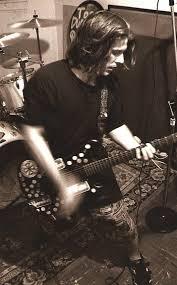 I have called myself an actor and a writer but to this day I still have a hard time calling myself a musician. When I began my rock band career in 1986 with Ben Foster, I could barely play. My influences were heavy metal guitarists, Randy Rhoads and Brian May, but I could not for the life of me pick or strum guitar like them. When Screeching Weasel started playing out, I would break at least 2 to 3 strings a night. I battered the shit out of them with a tense hand. I have learned to relax, to use thicker strings and thinner picks, but that feeling is still there. Guitars have always felt like a foreign object in my hands. Now 30 years later while analyzing myself as a guitarist I realize that I had always treated the guitar more like a tool than an instrument, like a hammer. I had to pound sound out of this device, that was the only way I could make it work. It wasn’t a precision crafting tool of a seasoned carpenter, it was the rough edged hammer of a demolition crew. And causing such pain to my guitar made it special to me, so I never became a connoisseur or collector of expensive guitars. I did not collect the best crafted instruments, I did not know a good guitar wood from bad. I did not hear the difference when I replaced my guitar bridge with a Flair Pen cap. I am not a materialist, I am a man who humanizes objects till they become special to him. My 3 electric guitars over 30 years were friends, but friends that I could destroy, and I felt they were OK with that. I started Even In Blackouts to try to become a musician, and all I can say is this Actor/Performer/Writer/Wizard will never achieve musicianship in this lifetime. I have come to terms that this is a self imposed endless battle, and that is OK, it won't stop me from trying. It’s been an amazing road, and I would never give up my days on stage. On my death bed (hopefully many many years from now), I can only hope these memories of being on stage, of pounding the shit out of my instrument, remain intact.
I have called myself an actor and a writer but to this day I still have a hard time calling myself a musician. When I began my rock band career in 1986 with Ben Foster, I could barely play. My influences were heavy metal guitarists, Randy Rhoads and Brian May, but I could not for the life of me pick or strum guitar like them. When Screeching Weasel started playing out, I would break at least 2 to 3 strings a night. I battered the shit out of them with a tense hand. I have learned to relax, to use thicker strings and thinner picks, but that feeling is still there. Guitars have always felt like a foreign object in my hands. Now 30 years later while analyzing myself as a guitarist I realize that I had always treated the guitar more like a tool than an instrument, like a hammer. I had to pound sound out of this device, that was the only way I could make it work. It wasn’t a precision crafting tool of a seasoned carpenter, it was the rough edged hammer of a demolition crew. And causing such pain to my guitar made it special to me, so I never became a connoisseur or collector of expensive guitars. I did not collect the best crafted instruments, I did not know a good guitar wood from bad. I did not hear the difference when I replaced my guitar bridge with a Flair Pen cap. I am not a materialist, I am a man who humanizes objects till they become special to him. My 3 electric guitars over 30 years were friends, but friends that I could destroy, and I felt they were OK with that. I started Even In Blackouts to try to become a musician, and all I can say is this Actor/Performer/Writer/Wizard will never achieve musicianship in this lifetime. I have come to terms that this is a self imposed endless battle, and that is OK, it won't stop me from trying. It’s been an amazing road, and I would never give up my days on stage. On my death bed (hopefully many many years from now), I can only hope these memories of being on stage, of pounding the shit out of my instrument, remain intact.
Published on March 23, 2016 08:30
October 21, 2015
Failed Album's for John Jughead Pierson designed by Paul Russel
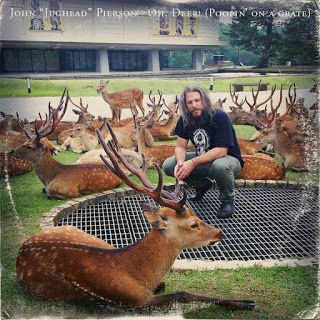 My Friend Paul Russel, is a powerhouse of strange ideas and artistic abilities. He was the artist who created the Weasel logo that is tattooed over thousands of bodies throughout the world. He created original art for Halo and other X Box games. He created my favorite Even In Blackouts logo. But this latest endeavor of his to turn my occasional selfie photos on facebook into failed albums from the 70's and 80's needs a place in satirical history.
My Friend Paul Russel, is a powerhouse of strange ideas and artistic abilities. He was the artist who created the Weasel logo that is tattooed over thousands of bodies throughout the world. He created original art for Halo and other X Box games. He created my favorite Even In Blackouts logo. But this latest endeavor of his to turn my occasional selfie photos on facebook into failed albums from the 70's and 80's needs a place in satirical history.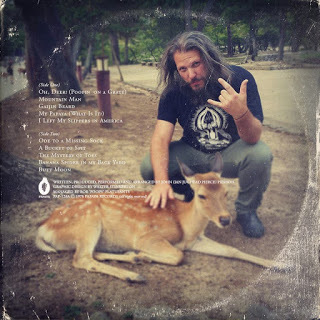
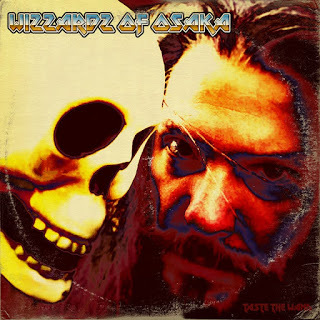
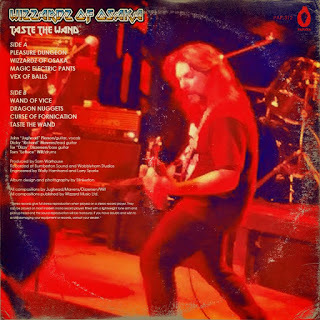
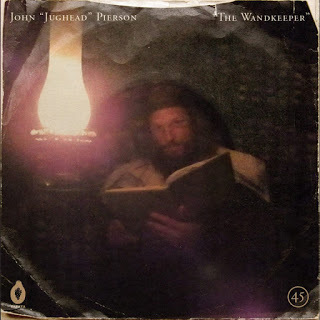
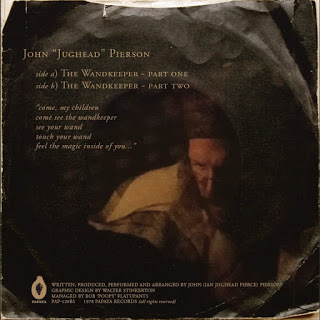
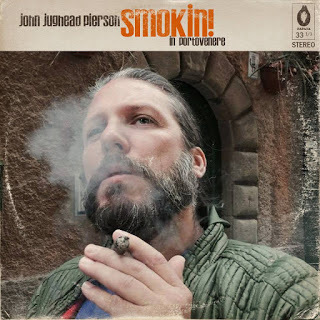
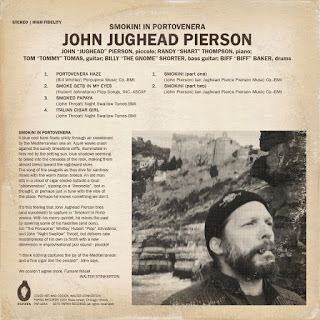
Published on October 21, 2015 09:45
October 10, 2015
Grins & Saltwater
This was an old play I did for Too Much Light Makes The Baby Go Blind. During this time I began playing alot with a format where a viewer would be confused as to whether I was writing something funny or something serious. Not a new concept, but one that I hold dearly to my art making. This was one of the first successful ones from around 1987-88. Here is a demo version of it. I was planning on making a more highly produced one eventually. We'll see.
Published on October 10, 2015 18:45
August 29, 2015
WHERE IS PETER?
I want this blog post to be about my new short film in order to promote it, but my creativity has it’s own mind and will take my initial salesman pitch, pull it a part, add it’s own agenda, and then cast it out into the world in multiple directions, making, what I believe to be, an interesting read, but a not so wise promotional tool. So I will just say now before tangents invade, that this short film was first created for the stage with the help of the Chicago Neo Futurists and the film version, itself, was created with the help of the New York Neo Futurists. It is about my dead friend, Peter Flynn. He killed himself one day in New Orleans. He hung himself from a rope on the edge of an outdoor staircase at his house, then supposedly tried to kick himself loose but then “accidentally” tumbled down the stairs, breaking his neck. Peter liked to live on the edge and that is what makes this outlandish interpretation of his motives believable. The script’s goal was not intended to be cathartic, a device to release the pain of his loss. It was intended to acknowledge the persistence of loss’ tight grip on the living, whether we like it or not, and to face it with a more understanding respect, permitting this knowledge of the unquenchable nature of loss to help us grow more mature rather than to stagnate in denial.
Being a writer and a performer for me has always been more of a fluid process than one about achieving specific goals marked and solidified by time. I am one who floats simultaneously in multiple directions through ambling space more so than I am an artist traveling down a specific path planting mile markers, cementing my views in concrete, and sketching it out in my detailed topography map book. But if I really try hard to contemplate my life long enough I can gather together blurry patches in my past and view them as stages towards being a better artist.
1. When I first started writing long form plays, I would let it pour out of me without self-reflection. I would leave it up to my actors to help me figure out what the fuck I had just written.
2. Before the point of meeting Peter Flynn, a friend, musician, artist, mad man, pain in the ass, I would refuse to call myself, writer, performer, actor or musician. It was a bit pretentious, not wanting to be labeled. Yet I still feel to this day there is something correct about that attitude. But this hesitance to be labeled, I had felt then, was also based in a fear of disappointing myself and others, of claiming to be something I could never truly live up to. Peter would often give me the most gnarly angered look, with a grin tucked within, when I mentioned this, and he would say, “Fuck you! You’re a WRITER. Grow up!” One night while at a friends wedding Peter wrote in the guest book, “The Road”, and then when I saw this I chose to write “The River.” This began my furiously quick scribbling down of a play called The Road & The River. On one of its more hidden levels the play explores the balance to be struck between unbridled spontaneity and well thought out intentionality. This was one of the most important stages of admitting I was a writer amidst the memories of my blurred past.
3. The next stage of this viewing of my process was during my most well received play called, Living In The Present Tense. It’s a somewhat nonlinear play that begins at the end and moves back and forth to its beginning. (And yes this was written before Memento and Pulp Fiction, but way after Harold Pinter’s play Betrayal. I say this to defend my influences.) I chose this structure so that I could spontaneously come up with a scene, but instead of building the mystery forwards, I could let it unfold revealing it’s beginning. I created it backwards so that the beginning was well thought out and planned and was a direct product of it’s ending. And through analyzing this choice during it’s staging I began to realize that my structure choice was a mirror of emotions evoked. It created confusion, but entertaining and enthralling enough to want to search out its meaning. Its meaning was the betraying nature of seeking out meaning, and the structure and content were harmonious in this goal. This was an accidental product that from now on in my work had to be thought about in advance and incorporated intentionally, there were no more excuses to NOT know what I was writing. And here I can mention Peter again. I was so excited to have him come see this play. He hated it. He thought I was cheating, that it was grand for the sake of being grand, and that it was simpleminded, and beneath me. This could be true, in some ways I knew what he meant, but I also knew that he knew me well enough to know that that criticism would only make me fight harder to make those same choices work even better in my future projects.
4. I could go forth exploring stages that I make up as I continue to write, but I will jump to the end. The end was near the beginning of my work with the Neo Futurists. Here there is a whole other series of blurry incidences that I could construct into a narrative about my growth as a writer. I won’t. I will just say that when Peter died, I wrote quite a few plays talking about his life, about our adventures, stories that I could never deny make me WHO I am today. But like coming to understand the balance between spontaneity and intentionality, I started to realize these plays were good but lacked something, on some level all these plays fell flat. To describe Peter was to NOT bring him back, it was a flimsy recreating of a complex human being. The only way to turn Peter into a meaningful play, at the time, was to write about how I FELT about his loss, to express the emotion in actions and tightly scripted futile, metaphor laden, directions, “how to remain friends with a dead man.” I took all the things I learned about how short pieces should have multiple layers and meaning, and that you don’t have time to dilly dally, so make every moment count, be abstract but also tangible, personal but also universal. This is the closest I think I ever got to all those goals and the closest I will probably ever come to sharing the affect of Peter with my audience.
Published on August 29, 2015 17:59
January 12, 2015
TEN FROM THE BASEMENT EPISODE 1: HARD ROCK/HEAVY METAL
Hey music fanatics, you may be the only ones who like this. But while it takes me long periods of time to piece together my Jughead's Basement Podcast, because of interviews and editing, I have decided to experiment with a side podcast that explores the different genres that have influenced me. These are done quick, in one night. They are full songs by bands of a certain genre and have short stories of their influence on me. Honestly I don't know if this would be interesting to anyone, but wanted to give it a try.
This one is a first attempt at Hard Rock/Heavy Metal. If I continue this format I'm pretty sure there will be a couple under this heading. This one tends to focus on the chaos of my childhood and on my good friend from near birth John Braun.
PS: listening back two corrections so far:1. I comment on Paul Di'anno of Iron Maiden being bitter about his Iron Maiden days and not having anything else to say. I did not do enough studying online to make this sort of statement. I only saw a couple youtube videos that tainted my image of what I thought he would be, and decided not to search out anymore. He has had many non Iron Maiden related projects, and my info is shallow at best.2. I started highschool in 81 not 85. I graduated class of 85.
This one is a first attempt at Hard Rock/Heavy Metal. If I continue this format I'm pretty sure there will be a couple under this heading. This one tends to focus on the chaos of my childhood and on my good friend from near birth John Braun.
PS: listening back two corrections so far:1. I comment on Paul Di'anno of Iron Maiden being bitter about his Iron Maiden days and not having anything else to say. I did not do enough studying online to make this sort of statement. I only saw a couple youtube videos that tainted my image of what I thought he would be, and decided not to search out anymore. He has had many non Iron Maiden related projects, and my info is shallow at best.2. I started highschool in 81 not 85. I graduated class of 85.
Published on January 12, 2015 07:09
September 25, 2014
Crimpshrine
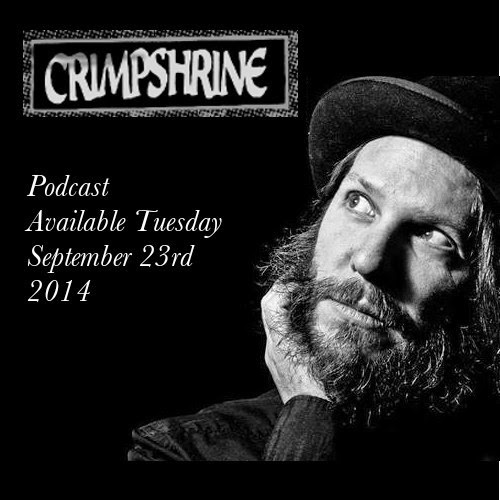 I worked on this podcast for longer than most the others. I took a chance with longer sections and longer podcast in general and with less emphasis on the music itself, trusting that the people into Crimpshrine would want to know as much as possible. Also I have a strong personal connection to the band and had to allow that to be part of the podcast. It makes me a tad uncomfortable to tie myself to a podcast as tightly as this one does, most obviously because it's not my story, but I can't deny that it fits into the band's narrative. I was also pleased that Pete Rypins agreed to participate. He was the one I had never met or even talked to before. I was very impressed with his eloquence and candor. Please give it a listen and place any comments below:
I worked on this podcast for longer than most the others. I took a chance with longer sections and longer podcast in general and with less emphasis on the music itself, trusting that the people into Crimpshrine would want to know as much as possible. Also I have a strong personal connection to the band and had to allow that to be part of the podcast. It makes me a tad uncomfortable to tie myself to a podcast as tightly as this one does, most obviously because it's not my story, but I can't deny that it fits into the band's narrative. I was also pleased that Pete Rypins agreed to participate. He was the one I had never met or even talked to before. I was very impressed with his eloquence and candor. Please give it a listen and place any comments below:Episode 14 - Selected Sequential Recordings From The Catalog Of Crimpshrine
Published on September 25, 2014 09:16
August 12, 2014
ANGRY SAMOANS' BACK FROM SAMOA
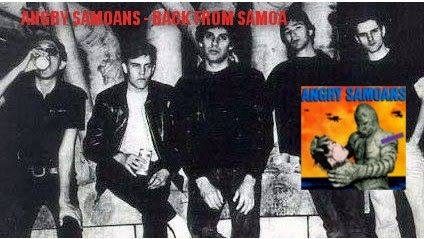 Jughead's Basement Podcast featuring Angry Samoans' Back From Samoa has been released. It is a long one and quite odd, if you ask me, the interviewer and editor. PJ Galligan (guitarist on the first two records) died of cancer while I was working on the interviews. He wanted to participate but couldn't speak because the cancer he was suffering from affected his ability to speak clearly. He wrote out his answers and I got an actor friend here in Japan to record his responses. They were long, too long for the podcast, and I had to edit them down. In his choice of words, and in the depth, I could hear a man telling a selected audience about a special part of his life for the last time. That may sound dramatic but while reading these, even before his death, this was the feeling I had. He came off sounding proud, humble, as strange as the rest of the band members, but ultimately he ended up sounding just like a regular man living out his life. He died in May, with the writing unfinished. He went on a hiking trip with Alice, his SO, (her words) and when he came back she said he sat down to upload his photos from the trip and then died. I decided to still include these parts even though I didn't want the weight of this event to affect the podcast as an oral document of the band. Alice searched his computer for more answers to questions he might not have not had time to send, but all she found was his self-written eulogy. Including these writings made the podcast difficult to navigate, and ultimately added to the oddness of the feel and extreme length of the podcast.
Jughead's Basement Podcast featuring Angry Samoans' Back From Samoa has been released. It is a long one and quite odd, if you ask me, the interviewer and editor. PJ Galligan (guitarist on the first two records) died of cancer while I was working on the interviews. He wanted to participate but couldn't speak because the cancer he was suffering from affected his ability to speak clearly. He wrote out his answers and I got an actor friend here in Japan to record his responses. They were long, too long for the podcast, and I had to edit them down. In his choice of words, and in the depth, I could hear a man telling a selected audience about a special part of his life for the last time. That may sound dramatic but while reading these, even before his death, this was the feeling I had. He came off sounding proud, humble, as strange as the rest of the band members, but ultimately he ended up sounding just like a regular man living out his life. He died in May, with the writing unfinished. He went on a hiking trip with Alice, his SO, (her words) and when he came back she said he sat down to upload his photos from the trip and then died. I decided to still include these parts even though I didn't want the weight of this event to affect the podcast as an oral document of the band. Alice searched his computer for more answers to questions he might not have not had time to send, but all she found was his self-written eulogy. Including these writings made the podcast difficult to navigate, and ultimately added to the oddness of the feel and extreme length of the podcast. What also added to the oddness is the disparate natures of the members themselves and their divergent perceptions of the workings of the band and even discrepancies about time itself. They each have their own quirky natures and they are all more than willing to share their eccentricities. Why would I expect any less from one of the most irreverent yet infectiously melodic punk bands? It's a complicated podcast and I'm not sure if it's even completely listenable, at least in one sitting. But I worked hard, while busy here in Japan, being a Wizard, and I think the finished product helps to show their importance in the punk scene. They were vitriolic, humorous, stupid, offensive, insane, self-centered, childish, intelligent, passionate, and incredible at writing the shortest catchiest profane songs out of any punk band I liked.
Angry Samoans' Back From Samoa
I'd also like to thank Jeromy Corp and Stewart Jones for supporting this podcast, Landon Gale-George for putting me in touch with Metal Mike and Bill Vockeroth, and Jason Brow for his hard work editing the interviews.
Published on August 12, 2014 22:10
July 10, 2014
IN JAPAN
New Short Interview by Justin Egli on his great blog about living in Japan: Ikimasho.
JUGHEAD IN JAPAN: AN INTERVIEW WITH JOHN PIERSON
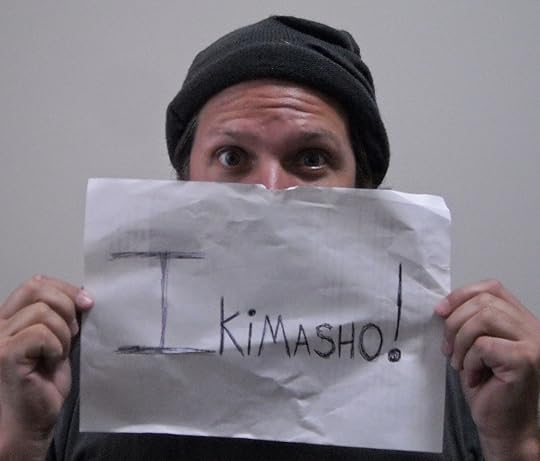
JUGHEAD IN JAPAN: AN INTERVIEW WITH JOHN PIERSON

Published on July 10, 2014 22:35



